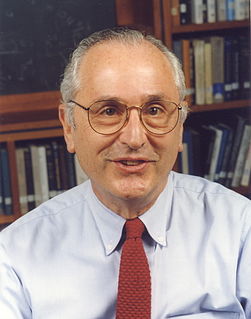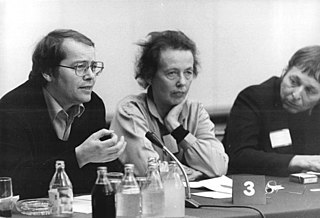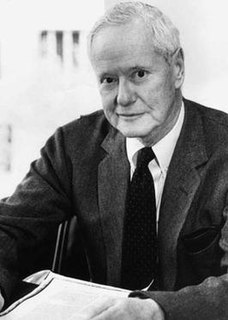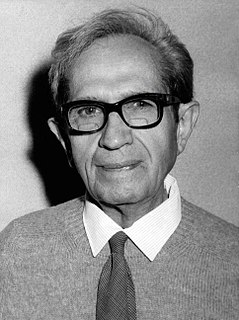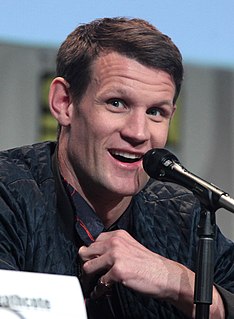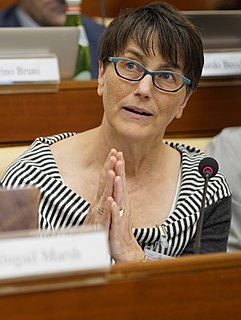Top 1200 Scientist Quotes & Sayings - Page 20
Explore popular Scientist quotes.
Last updated on December 24, 2024.
Have felt it myself. The glitter of nuclear weapons. It is irresistible if you come to them as a scientist. To feel it's there in your hands, to release this energy that fuels the stars, to let it do your bidding. To perform these miracles, to lift a million tons of rock into the sky. It is something that gives people an illusion of illimitable power and it is, in some ways, responsible for all our troubles - this, what you might call technical arrogance, that overcomes people when they see what they can do with their minds.
If you want to be a chef or a scientist, you've got to know what the current thinking is, so if you want to write comics or draw comics find out what the very best ones are and look at them all and then you'll know where the bars are because the bars are often very high, if you are going to make a splash and make yourself known, you need to get to that level.
I do not personally want to believe that we already know the equations that determine the evolution and fate of the universe; it would make life too dull for me as a scientist. ... I hope, and believe, that the Space Telescope might make the Big Bang cosmology appear incorrect to future generations, perhaps somewhat analogous to the way that Galileo's telescope showed that the earth-centered, Ptolemaic system was inadequate.
In fact, without a specification of a creature's goals, the very idea of intelligence is meaningless. A toadstool could be given a genius award for accomplishing with pinpoint precision and unerring reliability, the feat of sitting exactly where it is sitting. Nothing would prevent us from agreeing with the cognitive scientist Zenon Pylyshyn that rocks are smarter than cats because rocks have the sense to go away when you kick them.
Only when he has published his ideas and findings has the scientist made his contribution, and only when he has thus made it part of the public domain of scholarship can he truly lay claim to it as his own. For his claim resides only in the recognition accorded by peers in the social system of science through reference to his work.
Letting the religious right teach ID in schools is like letting the Marines teach poetry in advanced combat training. As a scientist, I see these the relevancy between the two sets to be equal. If Kansas is going to mess up like this, the least it can do is not be hypocritical and allow equal time for other alternative "theories" like FSMism, which is by far the tastier choice.
A reporter called on Edison to interview him about a substitute for lead in the manufacture of storage batteries that the scientist was seeking. Edison informed the man that he had made 20,000 experiments but none had worked. "Aren't you discouraged by all this waste of effort?" the reporter asked. Edison: "Waste! There's nothing wasted. I have discovered 20,000 things that won't work."
Many a scientist has patiently designed experiments for the purpose of substantiating his belief that animal operations are motivated by no purposes. He has perhaps spent his spare time in writing articles to prove that human beings are as other animals so that 'purpose' is a category irrelevant for the explanation of their bodily activities, his own activities included. Scientists animated by the purpose of proving that they are purposeless constitute an interesting subject for study.
You like to explore things, and your parents don't like it because it gets the pots and pans dirty, and because it's noisy - but for you it's fun, you're resting. You're actually doing experiments... Just tell your parents that they're experiments, and you want to become a scientist, and then they won't stop you from doing anything you want.
Humans will eventually become extinct. People treat that as a radical thing to say. But the fossil record shows us that everything eventually becomes extinct. It depends what "eventually" means. But the idea that were going to be around for the rest of global history...I don't think there's any scientist who would suggest that is true. It could be millions of years from now. We may leave descendants that are humanlike.
I told him that for a modern scientist, practicing experimental research, the least that could be said, is that we do not know. But I felt that such a negative answer was only part of the truth. I told him that in this universe in which we live, unbounded in space, infinite in stored energy and, who knows, unlimited in time, the adequate and positive answer, according to my belief, is that this universe may, also, possess infinite potentialities.
Stephen Hawking's A Brief History of Time tells the story of a cosmologist whose speech is interrupted by a little old lady who informs him that the universe rests on the back of a turtle. Ah, yes, madame, the scientist replies, but what does the turtle rest on? The old lady shoots back: You can't trick me, young man. It's nothing but turtles, turtles, turtles, all the way down.
the scientist's religious feeling takes the form of a rapturous amazement at the harmony of natural law, which reveals an intelligence of such superiority that, compared with it, all the systematic thinking and acting of human beings is utterly insignificant reflection. This feeling is the guiding principle of his life and work, in so far as he succeeds in keeping himself from the shackles of selfish desire. It is beyond question closely akin to that which has possessed the religious geniuses of all ages.
My colleagues in elementary particle theory in many lands [and I] are driven by the usual insatiable curiosity of the scientist, and our work is a delightful game. I am frequently astonished that it so often results in correct predictions of experimental results. How can it be that writing down a few simple and elegant formulae, like short poems governed by strict rules such as those of the sonnet or the waka, can predict universal regularities of Nature?
The three most effective incentives to human action may be ... classified as creed, greed and dread. ... In examining the scientist it is perhaps worth while to examine how far he is moved by these three incentives. I think that, rather peculiarly and rather exceptionally, he is very little moved by dread. ... He is in fact essentially a person who has been taught he must be fearless in his dealing with facts.
A scientist strives to understand the work of Nature. But with our insufficient talents as scientists, we do not hit upon the truth all at once. We must content ourselves with tracking it down, enveloped in considerable darkness, which leads us to make new mistakes and errors. By diligent examination, we may at length little by little peel off the thickest layers, but we seldom get the core quite free, so that finally we have to be satisfied with a little incomplete knowledge.
But will I always love her? Does my love for her reside in my head or my heart? The scientist in her believed that emotion resulted from complex limbic brain circuitry that was for her, at this very moment, trapped in the trenches of a battle in which there would be no survivors. The mother in her believed that the love she hadd for her daughter was safe from the mayhem in her mind, because it lived in her heart.
When a scientist considers all high-tech mental machinery needed to arrange words into ordinary sentences, prescriptive rules are, at best, inconsequential little decorations. The very fact that they have to be drilled shows that they are alien to the natural workings of the language system. One can choose to obsess over prescriptive rules, but they have no more to do with language than the criteria for judging cats at a cat show have to do with mammalian biology.
The chances of human beings being the only intelligent form of life in the universe are so minuscule that it's really kind of crazy to actually - no scientist could ever argue that we would be alone. It's much more likely that there are hundreds of thousands of other intelligences and other life forms out there in the universe just based on a strictly mathematical formula. And what that means is that artificial intelligence has probably already occurred in the universe.
From that night on, the electron-up to that time largely the plaything of the scientist-had clearly entered the field as a potent agent in the supplying of man's commercial and industrial needs... The electronic amplifier tube now underlies the whole art of communications, and this in turn is at least in part what has made possible its application to a dozen other arts. It was a great day for both science and industry when they became wedded through the development of the electronic amplifier tube.
A scientist, an artist, a citizen is not like a child who needs papa methodology and mama rationality to give him security and direction, he can take care of himself, for he is the inventor not only of laws, theories, pictures, plays, forms of music, ways of dealing with his fellow man, institutions, but also entire world view, he is the inventor of entire forms of like.
Self-interest is not myopic selfishness. It is whatever it is that interests the participants, whatever they value, whatever goals they pursue. The scientist seeking to advance the frontiers of his discipline, the missionary seeking to convert infidels to the true faith, the philanthropist seeking to bring comfort to the needy - all are pursuing their interests, as they see them, as they judge them by their own values.
I think creating the clothes is about creating historical images - and that's about more than fashion. It is about the fashion, the photography, what you are doing in the moment. It's what we call in French rechercher, or the search for that thing. So even though fashion is not scientific, I think being a designer is somewhat like being a scientist.
But the reason I call myself by my childhood name is to remind myself that a scientist must also be absolutely like a child. If he sees a thing, he must say that he sees it, whether it was what he thought he was going to see or not. See first, think later, then test. But always see first. Otherwise you will only see what you were expecting.
I happen to be a scientist. My background is in nuclear physics. I was a nuclear engineer. But I don't see any incompatibility at all with my religious faith and God the creator of everything and the incompatibility between when the earth was created as specified in the Bible. I don't see any incompatibility there because those that were interpreting God's overall message didn't know anything about modern-day science.
The leading student of business propaganda, Australian social scientist Alex Carey, argues persuasively that “the 20th century has been characterized by three developments of great political importance: the growth of democracy, the growth of corporate power, and the growth of corporate propaganda as a means of protecting corporate power against democracy.
I'm not the "not-working" type. I derive pleasure from my work. Work gives me relaxation too. Every moment I am thinking of something new: making a new plan, new ways to work. In the same way that a scientist draws pleasure from long hours in the laboratory, I draw pleasure in governance, in doing new things and bringing people together. That pleasure is sufficient for me.
As a scientist, objectivity is one of my most deeply held values. If we could just try harder, I once thought, surely we could each see the world as others see it and learn to respect one another's views more readily. But I learned from the Pirahas, our expectations, our culture, and our experiences can render even perceptions of the environment nearly incommensurable cross-culturally.
The economic dimension is very clear. I was at a dinner party, a mother got up, who's a very distinguished scientist, and said she had to get home and help her daughter with her homework. The two waiters, their faces changed. They were working their second jobs, they couldn't get home to help their kids with homework.
In the culture of America, in a free culture, you get what you celebrate. And in this culture, we have two obsessions, become a group that becomes a group that celebrates sports heroes and entertainment heroes. There's no room left for kids to see even a little bit of the opportunities to really, really get excited about becoming an inventor, an engineer, or a scientist, a problem solver.
I was watching Animal Planet. Did you know that the male seahorse has the baby? And I was thinking, "Why don't they just call that the female seahorse?" You know it's just some stubborn scientist. "Yeah, that one there's the male seahorse." And his assistant's like, "Uh, Bill, that one's having a baby." ... "The male has the baby. You're fired."
I want to clarify that one doesn't need to be a scientist or have fancy college degrees to know the truth about the health of our children, our communities, and the planet. Community members generally know far more about the health of their own communities than visiting "experts," yet that knowledge is often discredited because of another story that we tell ourselves: "real" education happens [only] in the halls of universities.
As soon as we cease to believe in such an engineer and in a discourse which breaks with the received historical discourse, and as soon as we admit that every finite discourse is bound by a certain bricolage and that the engineer and the scientist are also species of bricoleurs , then the very idea of bricolage is menaced and the difference in which it took on its meaning breaks down.
With space travel, [it's] no different. You know, in 1990 I read the name Virgin Galactic Airways. Loved the name. And set out to try to find an engineer or rocket scientist in the world who could build a safe, reusable rocket that could take people to and from space and we could start a whole new era of commercial space travel.
This is the most important joke I've ever heard. Niels Bohr, the founder of Quantum Physics, had a friend to dinner. As the friend left, he noticed a horseshoe nailed above Bohr's front door. He said to Bohr, accusingly, "Niels, you're a great scientist. You can't believe in superstitions." Bohr answered, "I don't, but apparently it works anyway."As with confirmation bias, we tend to lean toward superstitions that benefit us.
I quite like the transitions of being an actor, because you get to explore these little pockets of life. So if you're playing a builder you get to know about building, if you're playing a scientist or a physician or something you get to know about physics. And similarly with this world I like exploring their culture, that very sort of upper middle class, addictive... that's part of the reason I love it.
When a scientist doesn't know the answer to a problem, he is ignorant. When he has a hunch as to what the result is, he is uncertain. And when he is pretty darn sure of what the result is going to be, he is still in some doubt. We have found it of paramount importance that in order to progress we must recognize our ignorance and leave room for doubt. Scientific knowledge is a body of statements of varying degrees of certainty - some most unsure, some nearly sure, but none absolutely certain.
Those without the gate frequently question the wisdom and right of the occultist to guard his knowledge by the imposition of oaths of secrecy. We are so accustomed to see the scientist give his beneficent discoveries freely to all mankind that we feel that humanity is wronged and defrauded if any knowledge be kept secret by its discoverers and not at once made available for all who desire to share in it.
The knowledge is reserved in order that humanity may be protected from its abuse at the hands of the unscrupulous.
[When questioned on his longevity] First of all, I selected my ancestors very wisely. ... They were long-lived, healthy people. Then, as a chemist, I know how to eat, how to exercise, keep my blood circulating. ... I don't worry. I don't get angry at people. I don't worry about things I can't help. I do what I can to make the world a better place to live, but I don't complain if things aren't right. As a scientist I take the world as I find it.
So how does one go about proving something like this? It's not like being a lawyer, where the goal is to persuade other people; nor is it like a scientist testing a theory. This is a unique art form within the world of rational science. We are trying to craft a "poem of reason" that explains fully and clearly and satisfies the pickiest demands of logic, while at the same time giving us goosebumps.
[The scientist] believes passionately in facts, in measured facts. He believes there are no bad facts, that all facts are good facts, though they may be facts about bad things, and his intellectual satisfaction can come only from the acquisition of accurately known facts, from their organization into a body of knowledge, in which the inter-relationship of the measured facts is the dominant consideration.
The scientists I looked up to at the beginning were not Latino. They were famous scientists of many years ago, like Madame Curie. Later, I realized that there were also, but a very few, Latino scientists. There were good ones, but very few, because there wasn't as much a tradition to be a scientist in our culture. But this is changing.
Carl Armstrong was one of those people in the anti-war years who had been so convinced of the righteousness of their cause that he and some friends decided they would blow up a building at the University of Wisconsin, in which they said research was being done to help the war against the Vietnamese. What they blew up at three or four in the morning was a young scientist, who was married and had a couple of kids, who wasn't working on war stuff at all. And he was killed.
I always say that, like a scientist or anyone, you always want to be the problem-solver. You feel like, if you solve the greatest mystery or the greatest problem, then that makes you brilliant. It's the same thing with an actress. You want to be able to really tackle a character and make it a fully-dimensional human being who is complicated, funny and all the things that a person could be.
Scientific truth is not what any one scientist puts forth. It can be that, but it is generally not. It is the sum of multiple studies that all lean in the same direction in their results conducted by different people at different times of different nationalities with different competitive urges who all end up getting the same result. Then you have an emerging scientific truth, and then you put that in the textbooks, and that will never be shown to be wrong later on.
Louis [Leakey] was anxious to initiate a scientific study of these chimpanzees. It would be difficult, he emphasized, for nothing was known; there were no guidelines for such a field study; and the habitat was remote and rugged. Dangerous wild animals would be living there, and chimpanzees themselves were considered at least four times stronger than humans. I remember wondering what kind of scientist he would find for such a herculean task.
The TV scientist who mutters sadly, "The experiment is a failure; we have failed to achieve what we had hoped for," is suffering mainly from a bad script writer. An experiment is never a failure solely because it fails to achieve predicted results. An experiment is a failure only when it also fails adequately to test the hypothesis in question, when the data it produces don't prove anything one way or another.
In an ideal world the scientist should find a method to prevent the most severe forms of autism but allow the milder forms to survive. After all, the really social people did not invent the first stone spear. It was probably invented by an Aspie who chipped away at rocks while the other people socialized around the campfire. Without autism traits we might still be living in caves.
My dad was a scientist. More than that: my dad grew up in a tiny terraced house in Swansea, the only child of a second-generation immigrant family - his father sold cloth, zips and buttons from door to door - and so science - biochemistry at Swansea University, followed by a PhD at Imperial College - was his way out, his way up.
A favorite pro-abortion tactic is to insist that the definition of when life begins is impossible; that the question is a theological or moral or philosophical one, anything but a scientific one. Fetology makes it undeniably evident that life begins at conception and requires all the protection and safeguards that any of us enjoy....As a scientist I know, not believe, know that human life begins at conception.
On the other hand, famous evolutionists such as Dobzhansky were firm believers in a personal God. He would work as a scientist all week and then on Sunday get down on his knees and pray to God. Frankly I've never been able to understand it because you would need two totally different compartments in your brain, one that deals with religion and the other with everything else.
She had been living like a hermit herself, in a cramped, seedy apartment in Somerville, spending long hours in the lab. All-nighters had become a regular thing. She didn't have any close friends, didn't go out on dates, didn't even go to the movies by herself. She had sacrificed a normal life in order to get a PhD, and become a scientist.
A discussion between Haldane and a friend began to take a predictable turn. The friend said with a sigh, 'It's no use going on. I know what you will say next, and I know what you will do next.' The distinguished scientist promptly sat down on the floor, turned two back somersaults, and returned to his seat. 'There,' he said with a smile. 'That's to prove that you're not always right.'
I began studying human emotions more than twenty years ago. At that time, almost every scientist working in this area was studying one of the negative emotions, like fear, anger, anxiety, or depression. I wondered why no scientists cared to explain why we humans sometimes feel upbeat and pleasant. I liked the idea of charting new terrain. It's been a fun intellectual puzzle. There's so much to discover!


